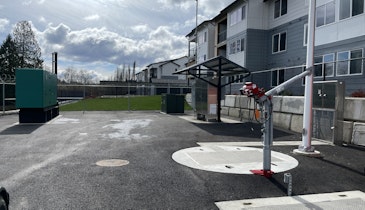Interested in Systems/ATUs?
Get Systems/ATUs articles, news and videos right in your inbox! Sign up now.
Systems/ATUs + Get AlertsA Realtors association asked health authorities in Tisbury, Massachusetts, to reconsider new nitrogen-reducing onsite regulations. The health board refused.
In October, the Tisbury Board of Health, located on the island of Martha’s Vineyard, expanded requirements for installing advanced nitrogen-removing technology. These new rules require advanced treatment when an existing septic system is upgraded, repaired or replaced. The new rules apply only to properties in the watersheds of Lagoon Pond and Lake Tashmoo.
In a letter to the health board, the Cape Cod & Islands Association of Realtors said the new rules will target one of the few areas of affordable housing on the island.
“We are writing to ask you to reconsider a portion of your new regulation, as your reconsideration will help with year-round home affordability and also maintain our common goals for clean water,” said the association’s letter, according to the Martha’s Vineyard Times.
“The average priced home that sold in these areas over the last year was $1.5 million — well below the island’s average of $2.2 million,” the letter said. “This action quite simply makes the more attainable properties in Tisbury more unaffordable.” The association asked the board to require a technology upgrade when a property is transferred.
Jeff Pratt, a member of the health board, said the town’s regulations are no more strict than changes considered by the state Department of Environmental Protection. The state recently implemented new rules establishing nitrogen-sensitive areas and requiring advanced treatment.
The health board voted unanimously to decline the association’s request.
Puerto Rico receives federal money for water infrastructure projects
Puerto Rico will receive more than $52 million from the federal government for a variety of water projects across the island.
About $30 million of the total comes from the Bipartisan Infrastructure Law passed last year, said a press release from the U.S. Environmental Protection Agency. The island’s Clean Water State Revolving Fund provides interest-free or low-interest money for wastewater infrastructure projects including decentralized wastewater systems, nonpoint source pollution control, stormwater runoff mitigation, green infrastructure, and water reuse.
Massachusetts town’s health agent proposes penalties for installing onsite systems without permits, licenses
The Mashpee (Massachusetts) Board of Health is considering a fine for people who install onsite systems without a permit.
Zackary J. Seabury, the town’s health agent, proposed the idea at the board’s November meeting, reported The Enterprise of Falmouth. He said his department has received calls during the past year asking for final inspections of systems he had never approved. A call just before the meeting involved a company not licensed to install systems in the town.
Seabury suggested a $150 fine for installing without a permit. A second offense would be penalized with a $300 fine, and people installing without a license could be fined $200. Subsequent violations during the same calendar year could result in the revocation or suspension of an installer’s license. The license could be reinstated in the following calendar year.
Falmouth onsite regulations to limit cesspools
The Falmouth (Massachusetts) Board of Health adopted a new set of onsite regulations that allow little room for cesspools.
Under the regulations, scheduled to take effect on Feb. 1, any cesspool discovered during a Title 5 inspection will be automatically considered to have failed, and it will have to be replaced with a system compliant with the state’s Title 5 rules.
Not all homes with cesspools will fall under the new rules, reported The Enterprise. Although any home being sold must pass a Title 5 inspection, homes with cesspools that passed inspection before Feb. 1 will not need immediate upgrades. Instead, the inspection will remain valid for two years for homeowners wishing to sell.
Adding bedrooms to a home will trigger a Title 5 inspection, and condominiums with five or more units must undergo inspections every three years.
Homeowners not selling their homes or adding bedrooms may keep cesspool systems as long as they are functional.
Bill to create a state septic code in Michigan pushed to 2024 session
The new Democratic majority in the Michigan state Legislature promised to pursue a statewide onsite code when the new session began this year, but they adjourned in November with the goal unfulfilled.
The onsite code was one of several environmental bills pushed into the next session in 2024, reported the news website MLive.com.
Legislators had introduced bills in the spring to create a statewide code. (Michigan is the only state without statewide rules for onsite systems.) Among other things, the bills: defined onsite systems; specified the duties of local health departments; required system inspections at least every five years; and created a technical advisory committee in the state Department of Environment, Great Lakes and Energy to make recommendations about the standards, technologies and qualifications of people who would inspect and manage onsite systems.
The bills also would create an onsite fund for administrative costs, for grants to local health departments to carry out their duties, and for grants to lower-income people who need to upgrade their onsite systems.
In 2022 legislators introduced a bill to require onsite system inspections at the time of a property sale, but that bill failed. It was opposed by the Michigan Realtors association.
Louisiana parish considers new inspection rule
St. Tammany Parish, Louisiana, is considering a new rule to require onsite system inspections every three years.
The unincorporated area is north of New Orleans on the other side of Lake Pontchartrain, and officials there estimate it may hold 36,000 onsite systems, according to the news site Nola.com.
If the ordinance passes, Tim Brown, director of the parish's Department of Environmental Services, said his four-person inspection staff will start with a test run of 400 inspections. Each homeowner will be charged $100 for the service.
Most homes use aerobic systems because of poor percolation in the dense red-clay soil. Troy Cooper, owner of Cooper Septic Services, told the news site that some property owners opt to not fix problems and continue with failing systems.
Grants to help repair and replace onsite systems in Oregon counties
Property owners in Tillamook, Clatsop and Columbia counties in Oregon are eligible for money to repair or replace failing onsite systems.
Backing the awards is a $1.5 million grant received by the nonprofit Community Action Team from state coronavirus recovery funds. Loans offered through the onsite repair program are interest-free and payment-free and available to people making 120% of the area’s median income. That’s about $60,000 for a single person and $75,000 for a family of three in Tillamook County. Loans are repaid when a property sells.
100th nitrogen-reducing onsite system installed in Nassau County
In October the 100th nitrogen-reducing onsite system was installed in Nassau County, New York. From its start in 2021 to the beginning of November, the county program to upgrade onsite systems has disbursed $4.2 million in grant funding. Homeowners are eligible for up to $20,000 to offset upgrade costs.
Neighboring Suffolk County started a similar program in 2017. Both counties are on Long Island where nitrogen pollution from onsite systems, many of them cesspools, has fouled nearshore waters. Obstacles still exist to broader adoption of nitrogen-reducing technology, reported the Long Island newspaper Newsday. The paper quoted Salvatore Motta, who co-owns Discount Cesspool & Drain Inc. and said complex permitting requirements are an impediment. "The process is so long and tedious that some homeowners don’t feel like doing it.”






